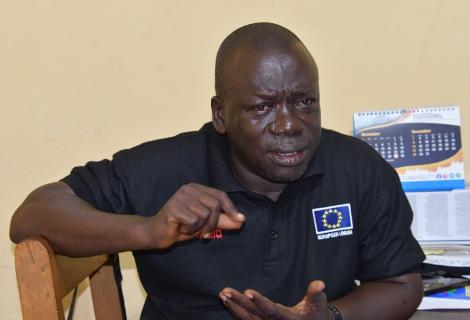ActionAid through EU project contributes to improving public accountability in Sierra Leone: Grantee Success, CSO Growth, and Policy Influence Highlighted in Kono District.

Impact of the EU project in Kono
Alpha Alhassan Conteh, coordinator for Advocacy for Accountability on Service Delivery, a grantee organization, shared his journey: "As one of the grantees, this grant has allowed us to solidify our organizational structure, and with this funding, we've moved from volunteer-based work to establishing routine and administrative work by recordkeeping and proper processing of our official documents. This is a significant success for our organization."
He further commented on the training received through the project: "The training for staff, volunteers, and interns is invaluable. Even beyond this project, CSOs can benefit from the knowledge shared" He also noted strengthened relationships and recognition gained with local councils: "The project has helped strengthen the relationship between us and the councils, especially in local-level policies development, and we aspire to influence these at the national level."
Conteh also emphasized the project's impact on their operational skills and increased recognition within the CSO space: "ActionAid enlightened us about networking and building coalitions for grant applications, opening doors for both individual and collective actions. This network facilitates easier review and strategizing. Also, our recognition with duty bearers has been top-notch. We have been making critical input in policy dialogue."
Looking ahead, Conteh outlined their sustainability plan: "As this project comes to an end, we aim to implement our training, by lobbing with our local council authorities here in Kono, to ensure our plans work at district, national, and global levels. While specific policy influence is still developing, Conteh affirmed: "I'm sure our critical thinking skills as a humanitarian organisation have contributed to substantial growth within the district, evident in our recent contributions to the audit service on health, education, and road maintenance funds." He also pointed out the need for broader audit scopes.
NON-GRANTEE
Alex Komba Fomba, Director for Youth Employment for Advocacy in Human Right and Development and chairman of Kono's civil society organizations, a non-grantee of the project, declared the project's value: "The training was very timely for Kono. While finance is crucial, capacity building was paramount for our organization. My team was positively impacted especially in project writing, resource mobilization, administrative setup, and community synergy."
Fomba highlighted organizational structuring: "This project helped structure my organization, particularly in capacity building. Immediately after the training, I advertised and recruited an M&E officer because I got to understand their relevance to our organisation. My coordination skills also improved." Despite not receiving a grant, he noted the broader impact: "Even without the EU grant, we've secured smaller grants, and the knowledge gained through the project can be reflected in other districts."
Fomba echoed the call for continuation: "My message to ActionAid and EU is that the projects they are implementing are very important; their continuity is crucial to national development."
Ibrahim Ahmed Sam-Bokarie, Coordinator of Community Mobilization for Concern Citizens Governance Network, another non-grantee, shared his experience: "We had several valuable trainings. While our grant application wasn't successful, missing an opportunity isn't the end; our relationship with ActionAid continues." He emphasized personal and organizational growth: "The training enhanced my personal and organizational development, especially in policy work at local and national levels and collaboration with local councils. Post-training, we secured credit from other organizations, greatly enhancing our staff's capacities, particularly in financial reporting and proposal writing."
He expressed hope for future opportunities: "I would love to see an extension of such projects and hopefully be more engaged in it through securing a grant."
Rebecca Julie Yambasu, the Deputy District Council Chairperson for Kono district, lauded ActionAid's transparency and impact: "My impression of ActionAid is that they are very transparent and accountable. They always involve stakeholders in budget discussions for all activities. Their work across the district, especially in infrastructure and human capital development, is a significant help to the government. Their community-based approach is commendable, especially given the government's resource constraints." Yambasu highlighted improved collaboration: "This EU project has helped in making the council more visible and bridge the gap with the people." She also noted strengthened CSO participation: "It has strengthened CSO participation in government and encouraged constructive criticism through the network of ActionAid and ASJD." Yambasu pointed to policy influence: She concluded with strong support: "We are very happy for ActionAid and pray they have more funding for such a beneficial project; we urge for continued support."
UNIVERSITY INTERN
Paul Dabor Thomas, EU project participant from the University of Management and Technology Kono campus, shared his personal growth: "Being part of the project was a great opportunity. After university, I realized there was much to learn in the corporate world. This project helped me develop reporting skills. With the skills gathered, I now manage an organization focused on youth activism, while other interns are working for different organizations. We also learned a lot about building relationships with MDAs and engaging with people affected by HIV."
These diverse perspectives show a clear picture of a project that is not only fostering sustainable growth, but also enhancing civic engagement, and influencing policy, leaving a lasting positive impact on the Kono district.